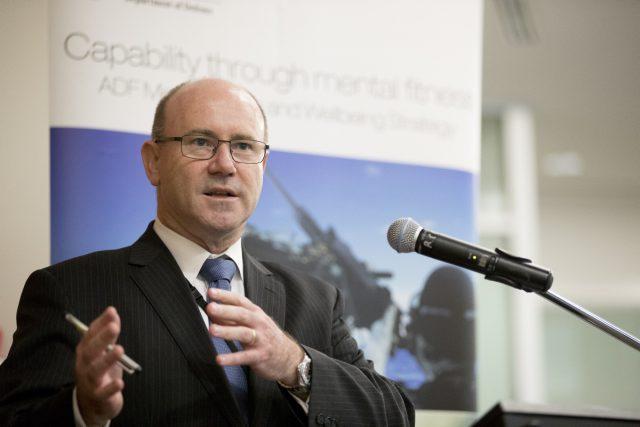Talking to the chiefs: Greg Moriarty (part 1)
Posted By Brendan Nicholson on May 4, 2018 @ 06:00

The hard part of running the Defence organisation is the trade-offs—lining up capability, strategy and resources to work out what can and can’t be done, says Department of Defence Secretary Greg Moriarty.
‘A challenge I’ve faced, that I think is an essential role of the secretary and the Chief of the ADF, is aligning those three elements,’ says the department head who’s now eight months into the job.
‘A lot of people have views about either defence policy or platforms and it’s good to be able to read, to listen to all of those. But the hard challenge for government is the decisions that I and the CDF, and the senior leadership group in Defence, take to make recommendations to government about shifting resources to respond in an agile way to changing circumstances.’
Moriarty says that’s very difficult work but it’s also incredibly important and rewarding. ‘To think I’d like to be able to do this but I can’t do as much of it, or as quick as I’d like. So how am I going to balance that with a whole range of other work that the government’s asked us to do?
‘The hard part is to bring it together and make really hard choices, and to offer government advice on those trade-offs. I take that responsibility very seriously. And I know the CDF does, as well. They’re hard choices to make.’
With a decades-long $200 billion re-equipment program underway, is the government pushing too hard to get things done too fast?
‘No,’ says Moriarty. ‘The government is ambitious and has set a very demanding timeline. But the institution has also been given the resources to deliver to the timeline and we’re going to deliver as best we can to meet the government’s objectives.’
So is the whole program achievable? ‘It’s achievable but it’s challenging. And it’s putting some pressure on the organisation, but we just have to respond to that.’
Far from coming to the job as a Defence neophyte, Moriarty has spent a lot of time there before. He joined the department in 1986, and in 1988 he graduated with the Sword of Honour and top of his class as an officer in the Army Reserve.
Moriarty spent most of that first decade in the Defence Intelligence Organisation, and in his mid-20s he was sent to Saudi Arabia as an intelligence officer in the headquarters of US Central Command working for General Norman Schwarzkopf during the First Gulf War.
He was part of a DIO detachment and on full-time army service as a uniformed captain during Operation Desert Shield and then Desert Storm as part of a team of ground forces analysts preparing intelligence briefings for General Schwarzkopf and his senior commanders.
‘I was there with outstanding Australian Defence Force personnel, including some who are still serving with the Defence organisation,’ says Moriarty. ‘It was an amazing experience. I greatly admired General Schwarzkopf, who was a very charismatic leader. Everybody who worked on his headquarters was very impressed with his personal dynamism, but also by his strong strategic vision and his view of the importance of allies and partners.’
Defence, security and diplomatic issues have remained the focus of Moriarty’s working life, with key points as ambassador to Iran and to Indonesia, Commonwealth Counter-Terrorism Coordinator, International and National Security Adviser and chief of staff to Prime Minister Malcolm Turnbull.
Moriarty was ambassador to Iran from 2005 to 2008. The Americans didn’t have an embassy in Tehran and invited him to Washington to brief President George W. Bush and a small number of his senior advisers.
‘They were very interested in a range of perspectives. We have something to offer through the presence we have in our embassy and people in our system who have deep insights into Iran and the Middle East,’ he says. ‘We benefit from the US information and intelligence picture in so many places globally, so being able to share perspectives with the Americans, I thought, was a useful thing that Australia could do.’
‘US presidents receive a lot of briefings on Iran and the other strategic challenges in the Middle East, and President Bush was interested in our perspective.’
How did such experiences shape the thinking he brings to Defence?
‘When it comes to Australian national power, we need to think more holistically. When the government talks in defence and foreign policy white papers about the need for integrated, coordinated policy approaches, I think that’s absolutely right.’
As a diplomat, he spent considerable time considering how the various elements of Australia’s national power could be used to influence policy outcomes or to convince another country’s government to adopt a position or to accept an Australian view. ‘You have to think about how countries meet the challenge of having their strategic preferences accepted. You need to think about the range of tools that a government has to exercise influence or power.’
‘I thought a lot about Australian power, our economic power, military power, diplomatic capacities. And about how all sorts of things contribute to that—from the standing and the reach of our educational institutions, our universities, to how we are perceived and how our business community is perceived. That includes things like the New Colombo Plan, our students, the reach that we have in the region through our businesses.’
‘Security cooperation and collaboration contribute in a very positive way for Australia,’ he says. The role of the ADF doesn’t simply involve delivering operational outcomes, but also what can be done through exercises, exchanges, and training and development through the defence cooperation program.
‘I have thought about what we do well and what we don’t do well. In the strategic environment that we face, boundaries are blurring between traditional security threats and contemporary security threats. That’s making whole-of-government responses even more compelling.’
Article printed from The Strategist: https://aspistrategist.ru
URL to article: /talking-chiefs-greg-moriarty-part-1/
Click here to print.